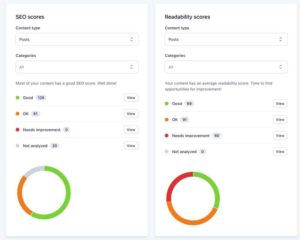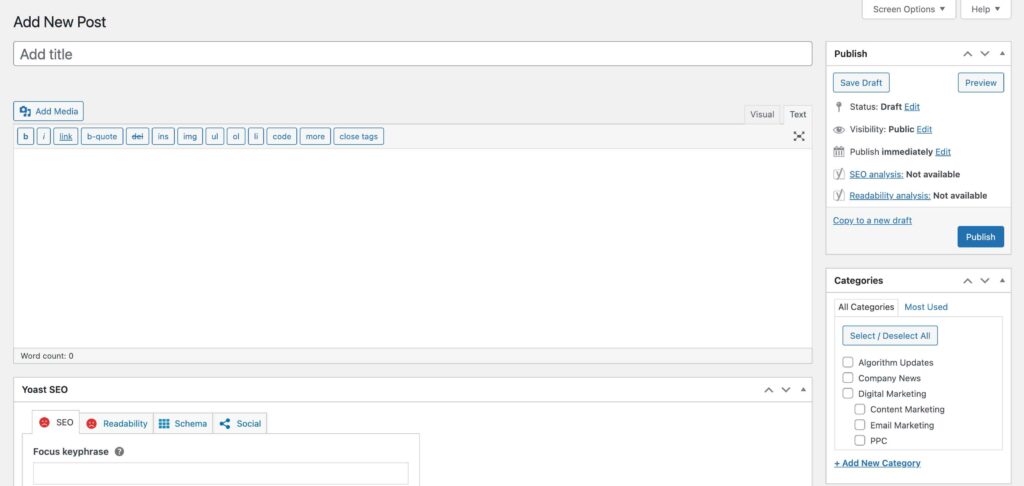In today’s digital landscape, having a website that ranks well in search engines isn’t just nice to have—it’s essential for business survival. As a small business owner, choosing the right platform for your website can make the difference between being found by potential customers or getting lost in the vast ocean of online content. While there are several popular options available, WordPress consistently proves itself to be the superior choice for SEO-focused websites. Let’s explore why WordPress stands head and shoulders above alternatives like Wix, Squarespace, and Shopify when it comes to search engine optimization.
The WordPress Advantage: Built for SEO From the Ground Up
WordPress powers over 43% of all websites on the internet, and there’s a good reason for this dominance. From its inception, WordPress was designed with content management and search visibility in mind. The platform’s core architecture creates a foundation that search engines love.
When you build your small business website on WordPress, you’re starting with an SEO-friendly structure that gives you a competitive edge. The platform generates clean code and creates a logical hierarchy for your content that makes it easy for search engine crawlers to understand and index your pages. This might sound technical, but the practical benefit is simple: WordPress helps Google understand what your business offers so it can show your website to the right people.
Complete Control Over Your SEO Elements
One of the most powerful advantages WordPress offers is granular control over all the elements that affect your search rankings. With WordPress, you can easily customize:
- Page titles and meta descriptions (the text that appears in search results)
- URL structures (keeping them short and descriptive)
- Image alt text (helping search engines understand your visual content)
- Internal linking structure (guiding both users and search engines through your content)
- Header tags and content organization (creating a clear content hierarchy)
While platforms like Wix and Squarespace do offer basic SEO features, they simply don’t provide the level of control and customization that WordPress does. This limitation can become increasingly frustrating as your business grows and your SEO strategy becomes more sophisticated.
The Plugin Ecosystem: Supercharging Your SEO Efforts

Perhaps the most compelling reason WordPress excels for SEO is its robust plugin ecosystem. WordPress offers thousands of plugins specifically designed to enhance your website’s search performance, with many of the best ones available for free.
The Yoast SEO plugin, for example, has become an industry standard that guides even SEO beginners through optimizing their content for target keywords. It provides real-time feedback on content readability, keyword usage, and other critical factors that influence rankings. Similar comprehensive SEO tools simply don’t exist on platforms like Squarespace or Shopify, where you’re limited to the built-in SEO features.
Other powerful SEO plugins for WordPress include:
- Rank Math: A newer alternative to Yoast with additional features
- WP Rocket: For improving site speed (a crucial ranking factor)
- Broken Link Checker: For finding and fixing broken links that hurt user experience and SEO
- Schema Pro: For adding structured data that helps search engines understand your content
This plugin flexibility means your WordPress site can evolve alongside Google’s constantly changing algorithms without requiring a complete platform migration.
The Genesis Framework: Taking WordPress SEO to the Next Level
For small business owners who want to maximize their SEO potential, the Genesis Framework for WordPress offers additional advantages. Genesis creates an optimized foundation for your WordPress site with clean, lightweight code that loads quickly—a factor Google explicitly rewards with higher rankings.
Genesis themes are designed with both mobile responsiveness and SEO best practices in mind. They provide enhanced schema markup that helps search engines better understand your content and potentially display rich snippets in search results. While not essential for SEO success with WordPress, Genesis represents an advanced option for businesses ready to take their search visibility to the next level.
Mobile Optimization: Critical for Modern SEO
With Google now using mobile-first indexing, how your site performs on smartphones and tablets directly impacts your rankings. WordPress offers a massive selection of responsive themes that automatically adjust to different screen sizes, ensuring your site looks and functions perfectly regardless of the device.
While Wix and Squarespace have improved their mobile offerings, WordPress still provides more options and greater control over mobile optimization. Small touches like adjusting font sizes, button placement, and image scaling for mobile users can significantly impact both user experience and search rankings—and WordPress makes these customizations accessible even to non-technical users.

Content Creation and Management: WordPress’s Home Field Advantage
Content remains the cornerstone of effective SEO, and WordPress was built specifically as a content management system. The platform’s intuitive editor makes creating and updating content simple, encouraging the regular publishing that search engines reward.
WordPress also excels at organizing content with categories, tags, and custom taxonomies that create logical content structures. This organization helps both users and search engines navigate your site efficiently. While Shopify excels at product management and Squarespace at visual design, neither matches WordPress’s content management capabilities—a critical factor for SEO success.
How WordPress Compares to Popular Alternatives
WordPress vs. Wix
Wix has made significant strides in user-friendliness with its drag-and-drop interface, but its SEO capabilities remain limited compared to WordPress. Wix sites often generate complex code that can slow down page loading and confuse search engines. The platform also restricts your ability to modify technical SEO elements and lacks the plugin ecosystem that makes WordPress so powerful for search optimization.
WordPress vs. Squarespace
Squarespace delivers beautiful designs with minimal effort, but at the cost of SEO flexibility. The platform handles basic SEO elements adequately but offers limited options for structured data, advanced redirects, or custom optimizations that can set your site apart in competitive search results. For businesses in visually-driven industries, Squarespace’s design advantages may outweigh these SEO limitations, but most small businesses will benefit more from WordPress’s superior search optimization potential.
WordPress vs. Shopify
Shopify excels at one thing: e-commerce. Its built-in tools for product management and sales are excellent, and its SEO features for product pages are solid. However, for content-driven SEO strategies like blogging, resource libraries, or comprehensive service pages, Shopify falls short of WordPress’s capabilities. Many successful online stores actually use WordPress with WooCommerce for the best of both worlds—strong e-commerce features and superior SEO potential.
The Long-Term SEO Advantage: Scalability and Adaptability
Perhaps the most compelling reason to choose WordPress for your small business website is its unmatched ability to grow and adapt with your business. As search algorithms evolve and your SEO strategy becomes more sophisticated, WordPress provides the flexibility to implement advanced techniques without platform limitations.
With alternatives like Wix or Squarespace, you may eventually hit a ceiling where the platform’s limitations prevent you from implementing the SEO strategies needed to outrank your competition. WordPress’s open-source nature means there’s virtually no limit to what you can optimize and customize as your SEO needs become more complex.
Final Thoughts: Why WordPress Is the Smart Investment for SEO-Focused Small Businesses
For small business owners serious about maximizing their search visibility, WordPress represents the most powerful and flexible platform available. While it may require a slightly steeper learning curve than some alternatives, the SEO advantages it offers deliver long-term benefits that far outweigh any initial investment in setup and learning.
By choosing WordPress, you’re giving your business a foundation that can adapt to Google’s evolving algorithms, scale with your growth, and provide the customization options needed to stand out in increasingly competitive search results. In the world of SEO, having the right platform can make all the difference—and WordPress continues to prove itself as the platform of choice for businesses that want to be found online.

